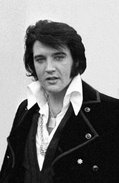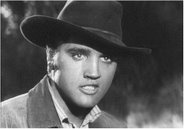On July 18, 1953 Presley paid $3.25 to record the first of two double-sided demo acetates at Sun Studios, "My Happiness" and "That's When Your Heartaches Begin", which were popular ballads at the time. According to the official Presley website, Presley gave it to his mother as a much-belated birthday present. Presley returned to Sun Studios (706 Union Avenue, Memphis, Tennessee) on January 4, 1954. He again paid $8.25 to record a second demo, "I'll Never Stand in Your Way" and "It Wouldn't Be the Same Without You" (master 0812).
Sun Records founder Sam Phillips, who had already recorded blues artists such as Howlin' Wolf, James Cotton, B.B. King, Little Milton, and Junior Parker, was looking for "a white man with a Negro sound and the Negro feel," with whom he "could make a billion dollars," because he thought black blues and boogie-woogie music might become tremendously popular among white people if presented in the right way. The Sun Records producer felt that a black rhythm and blues act stood little chance at the time of gaining the broad exposure needed to achieve large-scale commercial success."
Phillips and assistant Marion Keisker heard the Presley discs and called him on June 26, 1954, to fill in for a missing ballad singer. Although that session was not productive, Phillips put Presley together with local musicians Scotty Moore and Bill Black to see what might develop. During a rehearsal break on July 5, 1954, Presley began singing a blues song written by Arthur Crudup called "That's All Right". Phillips liked the resulting record and on July 19, 1954, he released it as a 78-rpm single backed with Presley's hopped-up version of Bill Monroe's bluegrass song "Blue Moon of Kentucky". Memphis radio station WHBQ began playing it two days later; the record became a local hit and Presley began a regular touring schedule hoping to expand his fame beyond Tennessee.
However, Sam Phillips had difficulty persuading Southern white disc jockeys to play Presley's first recordings. The only places that played his records at first were in the Negro sections of Chicago and Detroit and in California. However, his music and style began to draw larger and larger audiences as he toured the South in 1955. Soon, demands by white teenagers that their local radio stations play his music overcame much of that resistance.Still, throughout 1955 and even well into 1956 when he had become a national phenomenon, Presley had to deal with an entrenched racism of die-hard segregationists and their continued labeling of his sound and style as vulgar "jungle music". Allegations of racism were made against Presley, possibly by those segregationist elements who hated what he was doing. Jet examined the issue and in its August 1, 1957 edition, the African American magazine concluded that: "To Elvis, people are people regardless of race, color or creed."
Country music star Hank Snow arranged to have Presley perform at Nashville's Grand Ole Opry and his performance was well received. Nonetheless, one of the show's executives allegedly told Presley, "You ain't going nowhere, son. You may as well stick to driving a truck." Indeed, at the start of his fame, Presley didn't look like a rising star. Guitarist Scotty Moore described him as a "typical coddled son", still "very shy", and "more comfortable just sitting there with a guitar than trying to talk to you."
Presley's second single, "Good Rockin' Tonight", with "I Don't Care if the Sun Don't Shine" on the B-side, was released on September 25, 1954. He then continued to tour the South. On October 16, 1954, he made his first appearance on Louisiana Hayride, a radio broadcast of live country music in Shreveport, Louisiana, and was a hit with the large audience. His releases began to reach the top of the country charts. Following this, Presley was signed to a one-year contract for a weekly performance, during which time he was introduced to Colonel Tom Parker.
National exposure began on January 28, 1956, when Presley, Moore, Black, and drummer D.J. Fontana made their first National Television appearance on the Dorsey brothers' Stage Show. It was the first of six appearances on the show and the first of eight performances recorded and broadcast from CBS TV Studio 50 at 1697 Broadway, New York. After the success of their first appearance, they were signed to five more in early 1956 (February 4, 11, 18 and March 17 and 24
skip to main |
skip to sidebar

Elvis Presley

Elvis Presley
Elvis Presley: Biography, Music, Movies
Elvis Presley

Elvis Presley
Blog Archive
-
▼
2007
(32)
-
▼
March
(32)
- Elvis Presley
- Elvis Presley - Origin of the surname
- Elvis Presley - Early life
- Elvis Presley - Voice characteristics
- Elvis Presley - Sun recordings
- Elvis Presley - Presley and his manager "Colonel" ...
- Elvis Presley - Presley and African American music
- Elvis Presley - A danger to American culture?
- Elvis Presley - American icon
- Elvis Presley - Military service
- Elvis Presley - 1960s film career
- Elvis Presley - 1968 comeback
- Elvis Presley - 1969-1977 - Elvis's final years
- Elvis Presley - Abuse of drugs
- Elvis Presley - Death and burial
- Elvis Presley - Controversy surrounding death
- Elvis Presley - Political beliefs
- Elvis Presley - Devotion to his mother
- Elvis Presley - High school and early stardom
- Elvis Presley - The women in his life
- Elvis Presley - Anita Wood and Priscilla Beaulieu
- Elvis Presley - Last relationships
- Elvis Presley - The Memphis Mafia and other male f...
- Elvis Presley - Lasting legacy
- Elvis Presley - The fans
- Elvis Presley - The ritualization of the "Elvis cult"
- Elvis Presley - Critical voices
- Elvis Presley - The Elvis religion
- Elvis Presley - Presley in the 21st century
- Elvis Presley - Elvis lives?
- Elvis Presley - FBI files on Presley
- Elvis as a victim of blackmail
-
▼
March
(32)
Elvis Presley

Elvis Presley
Elvis Presley Films
1956 Love Me Tender
1957 Loving You
1957 Jailhouse Rock
1958 King Creole
1960 G.I. Blues
1960 Flaming Star
1961 Wild in the Country
1961 Blue Hawaii
1962 Follow That Dream
1962 Kid Galahad
1962 Girls! Girls! Girls!
1963 It Happened at the World's Fair
1963 Fun in Acapulco
1964 Kissin' Cousins
1964 Viva Las Vegas
1964 Roustabout
1965 Girl Happy
1965 Tickle Me
1965 Harum Scarum
1966 Frankie and Johnny
1966 Paradise, Hawaiian Style
1966 Spinout
1967 Easy Come, Easy Go
1967 Double Trouble
1967 Clambake
1968 Stay Away, Joe
1968 Speedway
1968 Live a Little, Love a Little
1969 Charro!
1969 The Trouble with Girls
1969 Change of Habit




No comments:
Post a Comment